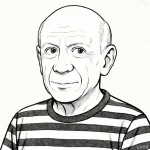“He who seeks does not find, but he who does not seek will be found.”

- July 3, 1883 – June 3, 1924
- Born in the Austro-Hungarian Empire
- Writer, lawyer
table of contents
Quote
“He who seeks does not find, but he who does not seek will be found.”
Explanation
In this enigmatic statement, Franz Kafka offers a paradoxical reflection on the nature of searching and discovery. The first part, “He who seeks does not find,” suggests that the act of actively searching for something—whether it is meaning, truth, or purpose—often results in frustration or failure. Kafka implies that seeking can create a kind of obstacle or expectation, where the desire for an outcome becomes a hindrance to the actual discovery. This aligns with a recurring theme in Kafka’s work, where characters, such as Josef K. in The Trial or Gregor Samsa in The Metamorphosis, seek desperately for answers to their existential dilemmas but are often met with absurdity, ambiguity, or futility.
On the other hand, the second part of the quote, “but he who does not seek will be found,” turns the idea of seeking on its head. Kafka suggests that sometimes, true revelation or understanding comes when we stop looking for it. Instead of chasing after external answers or solutions, we are found—perhaps by our own insights, by life’s unpredictable encounters, or by the forces that shape our existence in ways we cannot foresee. This aligns with a more passive form of discovery, where the most significant realizations often come when we release our expectations or let go of our pursuit. Kafka’s paradox suggests that the answers we seek may be waiting for us when we are not consciously searching, and that serenity or acceptance may be the key to finding what we need.
Kafka’s reflection resonates with the tension between effort and surrender. In the context of modern life, where we are often encouraged to pursue goals and actively seek success, this quote challenges the conventional wisdom that searching is always the solution. It speaks to the value of letting go—of not forcing outcomes, but instead allowing life to unfold in its own time. This could apply to personal growth, relationships, or even spirituality, where sometimes the most profound insights arise when we stop striving and simply allow ourselves to be present. In a world of constant pursuit—whether for success, happiness, or meaning—Kafka’s words remind us that sometimes non-attachment and acceptance can lead us to greater understanding than any amount of active searching. The quote suggests that in some cases, it is only when we stop seeking that we are found by what we were truly looking for, whether it is within ourselves or in the world around us.
Would you like to share your impressions or related stories about this quote in the comments section?

